Node.js hosting continues to be a top choice among developers for building fast, scalable applications from real-time tools and APIs to fully featured web apps. However, even the best code won’t shine unless it runs on a solid hosting platform. That makes selecting the right provider more important than ever.
As we move through 2025, the hosting landscape has matured. New platforms have emerged, and established ones have stepped up their game. With so many options now available, finding the right fit can be confusing. In this guide, we’ll explore the 7 best Node.js hosting platforms for 2025, highlighting their features, pricing, and usability, so you can make an informed decision with ease.
Before diving into the platforms, let’s quickly understand what makes a Node.js hosting service truly good. First off, it should support seamless deployment. Secondly, it must scale with your application’s growth. And lastly, it should give you great performance without making your wallet cry. Ready to find out which platforms made the list?
1. ServerAvatar
ServerAvatar is a managed cloud hosting provider that simplifies the deployment, management, and monitoring of servers and applications, no deep technical expertise required.
With ServerAvatar, you can deploy servers directly on top-tier cloud providers like DigitalOcean, Vultr, Hetzner (with Linode coming soon), without requiring your own cloud provider account.
You can effortlessly deploy and manage multiple applications such as WordPress, Laravel, n8n, custom PHP, or Node.js apps. From one-click deployments to advanced monitoring, automation, and built-in security features, ServerAvatar allows you to focus on growing your business while we handle the technical complexities.
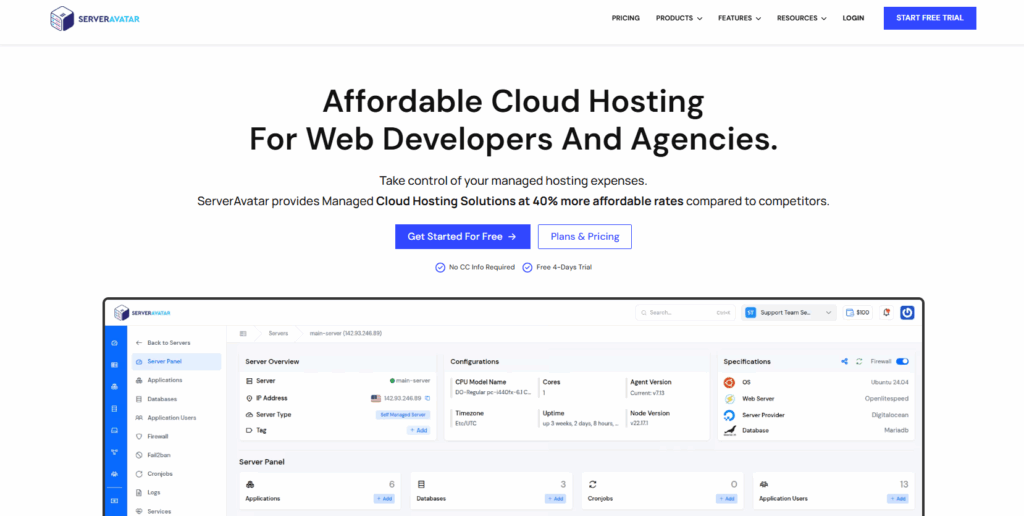
Pros:
- One-click server provisioning and app deployment
- Support for major cloud providers (AWS, DigitalOcean, Linode, etc.)
- Auto-installation and management of LAMP/LEMP stack
- Free SSL installation with automatic renewal
- Real-time server and application monitoring
- Daily automated and manual backup system
- Powerful log monitoring and analysis tools
- Unlimited application hosting per server
- Centralized dashboard for multiple server management
- Role-based team access and collaboration
- WordPress-specific tools (auto-installation, staging, cloning)
- Git deployment and continuous integration support
- Support for both Managed and Self-Managed servers
- Easy migration tools and guided setup wizards
- Firewall and security tools built-in
- 24/7 support (for managed servers)
- LiteSpeed and OpenLiteSpeed server support
- Affordable pricing with scalable plans
Cons:
- Learning curve if you’re not familiar with servers
Pricing:
Basic droplets plan started (DigitalOcean) with $10/month, includes unlimited apps and website If you want flexibility, cost savings, and control over your cloud servers without the hassle of manual setup, ServerAvatar is a solid choice for developers and agencies
2. Heroku
Heroku has been a favorite among developers for years. Even in 2025, it holds a solid place in the Node.js hosting ecosystem. Why? Because it makes things ridiculously easy. If you’re someone who just wants to focus on building your app without worrying about infrastructure, Heroku is your go-to.
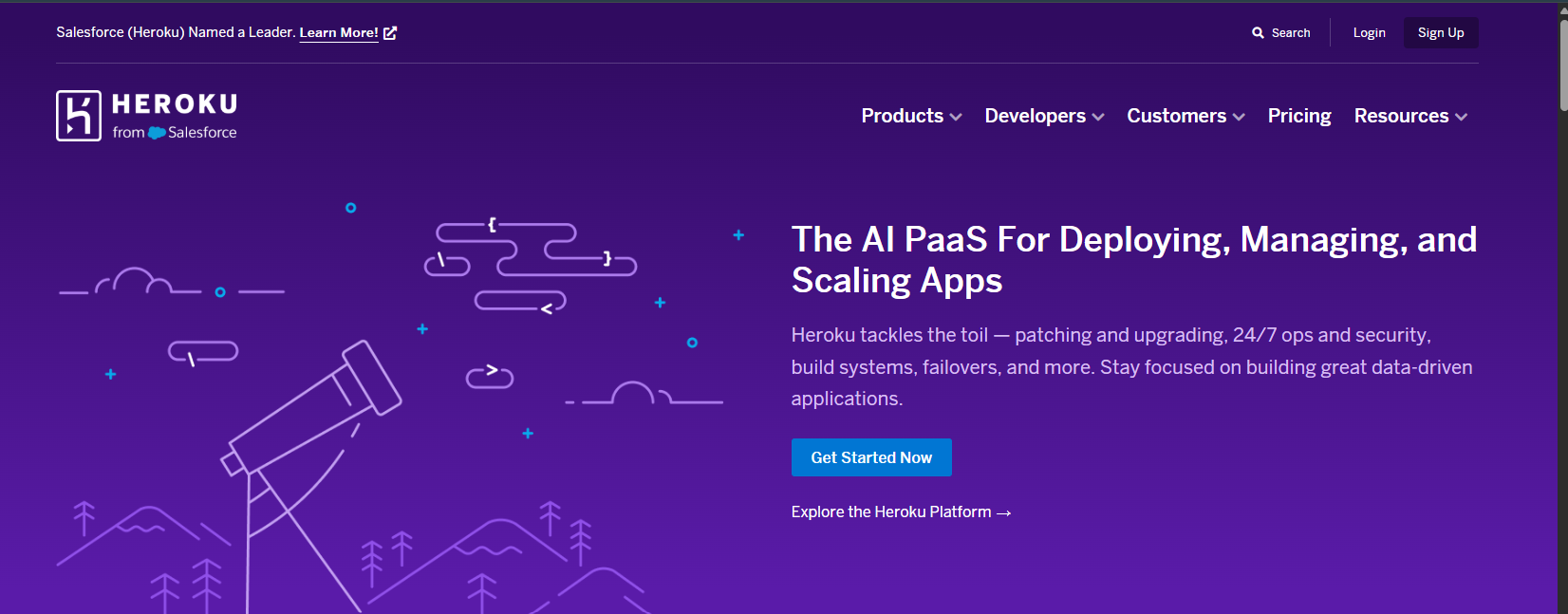
What makes Heroku special? First of all, it’s incredibly beginner-friendly. You can deploy a Node.js app in minutes using just a few Git commands. Heroku handles all the background work, server management, scaling, monitoring, and more. Plus, it has a rich ecosystem of add-ons like databases, email services, caching tools, and so on.
Heroku supports multiple Node.js versions, and you can easily set environment variables, enable automated deployments, and scale your app vertically or horizontally with just a few clicks.
Pros:
- Super easy to set up and use
- Great documentation
- Scalable and reliable
- Wide range of integrations
Cons:
- Can get expensive as your app scales
- Some performance limits on free plan
Pricing:-
Eco plans start at around $5 per month, which is pretty reasonable for Test ideas or run apps that see intermittent use. and Basic Plan starts from $7 per month for run small project and concepts.
If you’re building a small to medium-sized app, or just want a reliable, no-fuss experience, Heroku is a solid choice.
3. AWS Elastic Beanstalk
Amazon Web Services (AWS) is a giant in the cloud space. With Elastic Beanstalk, AWS tries to simplify the process of deploying applications, including Node.js ones, without making you handle all the cloud intricacies.
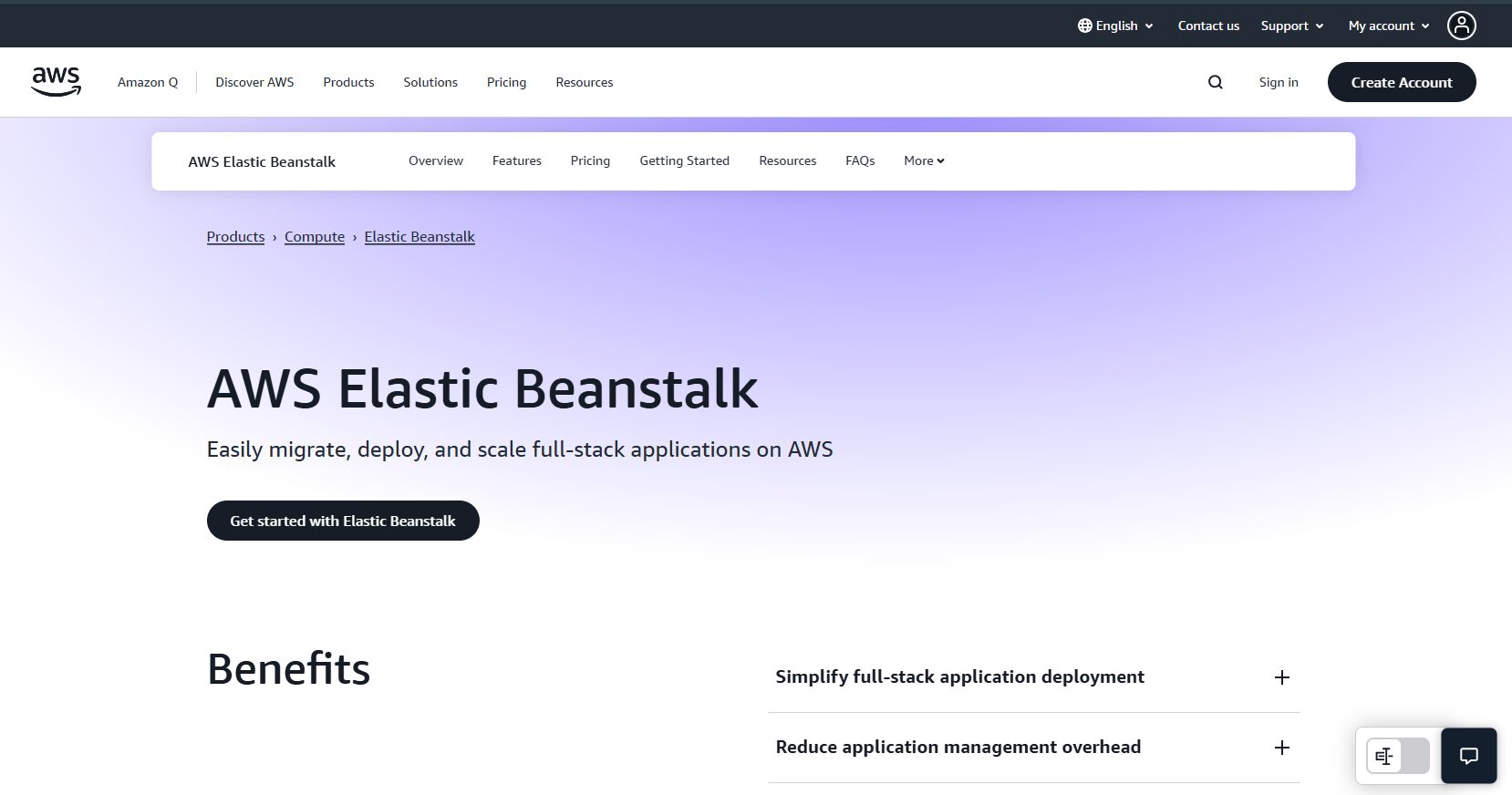
Elastic Beanstalk supports Node.js out of the box. You just upload your app, and it handles the provisioning of servers (EC2), scaling, load balancing, and health monitoring.
What’s powerful about Elastic Beanstalk? You get full control over your infrastructure if you want it, but you also have the option to let AWS automate everything for you. It’s a nice balance between managed and custom hosting.
Pros:
- Fully integrated with AWS services
- Scalable and flexible
- Great for enterprise-level apps
- Powerful monitoring tools
Cons:
- Steeper learning curve than other options
Pricing can be confusing
Pricing:
There’s no cost for Elastic Beanstalk itself, but you’ll pay for the AWS resources (EC2, RDS, etc.) it uses. That could start low, like $3–5/month for a small app, but can rise based on usage.
If you’re expecting high traffic, need powerful customization, or are already in the AWS ecosystem, Elastic Beanstalk is a strong candidate.
4. DigitalOcean App Platform
DigitalOcean is well-known for its developer-friendly cloud infrastructure. Their App Platform makes things even easier by offering a fully managed platform-as-a-service (PaaS) solution for Node.js and other frameworks.
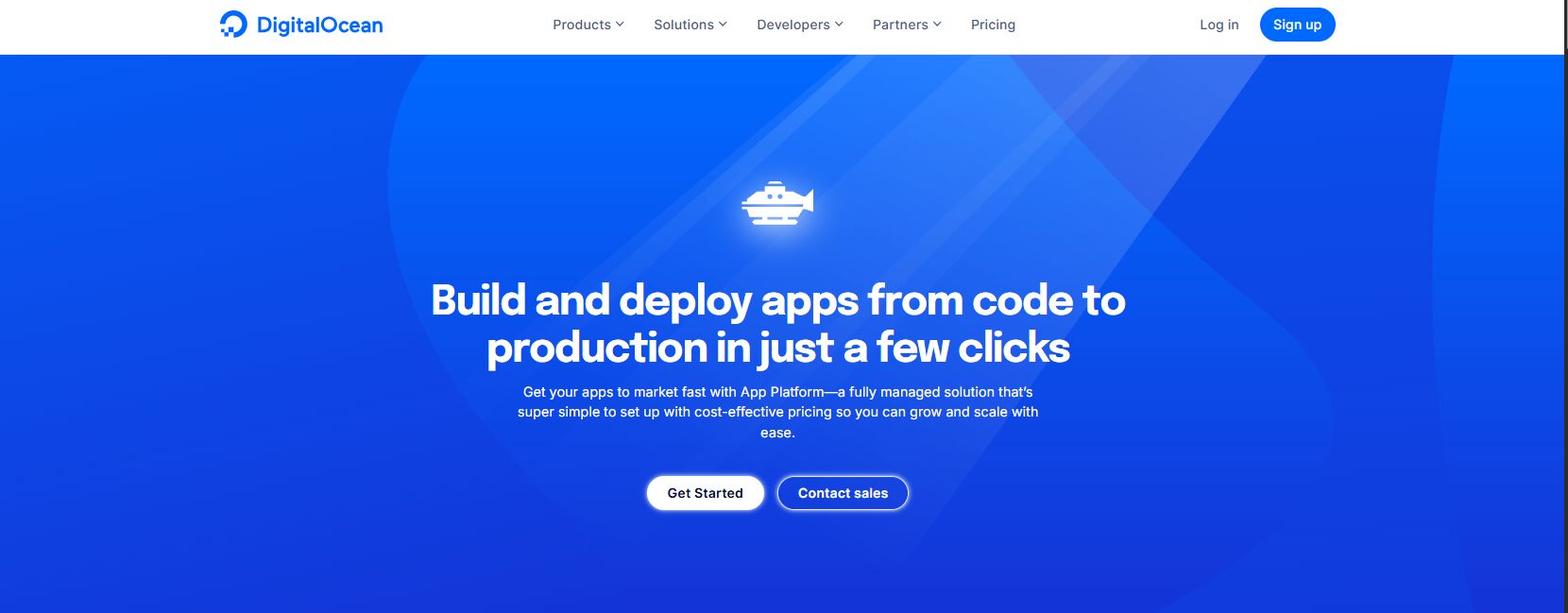
In 2025, the App Platform offers automated deployments directly from GitHub or GitLab. You push your code, and DigitalOcean takes care of the rest, provisioning servers, setting up Docker containers, and even managing updates and rollbacks.
What’s great about DigitalOcean App Platform? You get the power of DigitalOcean’s cloud with the simplicity of managed hosting. It supports scaling, custom domains, SSL, and background workers, all from a slick dashboard.
Pros:
- Affordable and scalable
- Clean UI and easy setup
- Backed by powerful infrastructure
- Automatic SSL, deployments, and rollbacks
Cons:
- Less flexible than full cloud solutions like AWS
- Advanced features may require moving to more expensive tiers
Pricing:
Starts with a free tier for static sites, but for Node.js apps you’ll likely start with the Basic plan at around $5/month. This is very affordable, especially for early-stage projects.
For those who want performance and simplicity in one package, DigitalOcean’s App Platform is a smart pick.
5. Vercel
Vercel is another big name that’s gained huge traction over the past few years, especially among frontend developers. While it’s most commonly associated with React and Next.js, it also provides excellent support for Node.js backends and APIs.
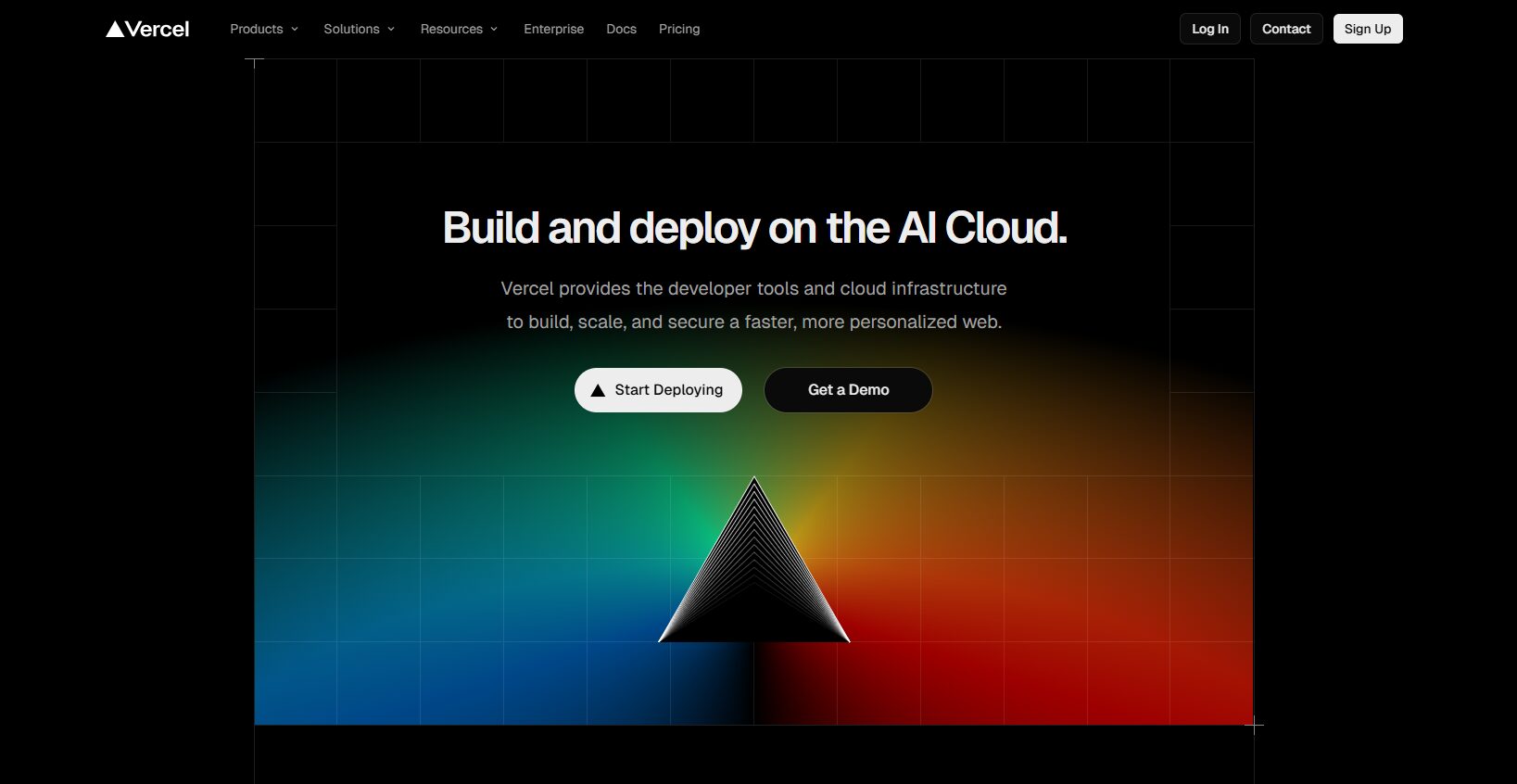
In 2025, Vercel has expanded its offerings and optimized its platform for speed and simplicity. Deploying a Node.js function or app is as easy as connecting your GitHub repo and clicking deploy. Seriously, it takes less than five minutes.
What makes Vercel stand out? It automatically handles performance optimization, CDN distribution, and caching. Your Node.js functions run as serverless functions, which means they scale instantly and only cost you when used.
Vercel is perfect for modern apps that need to be fast, scalable, and globally available. It’s especially ideal if you’re building JAMstack or full-stack applications with a Node.js backend.
Pros:
- Fast and easy deployment
- Global CDN out of the box
- Great integration with modern frontend tools
- Auto-scaling and low latency
Cons:
- Not ideal for long-running backend processes
- May be overkill for simple apps
Pricing:
There’s a free tier with generous limits, and paid plans start at around $20/month for teams or advanced features.
In short, if you want cutting-edge deployment with minimal effort, Vercel is a top-tier choice.
6. Render
Render is a rising star that has made a name for itself by offering the power of traditional cloud hosting with the ease of Heroku. And in 2025, it’s looking better than ever for Node.js developers.
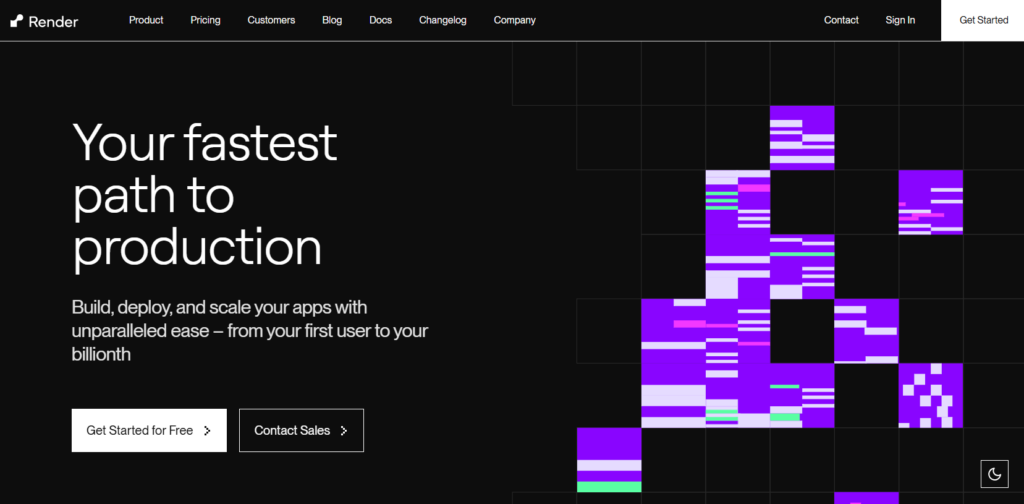
Render lets you deploy full-stack applications with minimal setup. You can host web services, static sites, background workers, and even cron jobs with just a few lines of configuration.
Why is Render gaining popularity? Because it hits the sweet spot between power and simplicity. You don’t need to fiddle with infrastructure, but you still get detailed control when needed. It supports auto-deploy from GitHub, HTTPS out of the box, and automatic scaling.
Pros:
- Simple yet powerful
- Great performance and scaling
- Ideal for full-stack apps
- Developer-friendly features
Cons:
- Still maturing compared to giants like AWS
- Limited documentation in niche cases
Pricing:
Starts free, and paid plans are competitive, around $7/month for a web service.
If you want something better than basic hosting but less complex than full cloud services, Render is a fantastic middle-ground.
7. Railway
Railway is a developer-centric platform that has exploded in popularity thanks to its simplicity and speed. By 2025, it’s widely considered one of the smoothest ways to host Node.js applications. Whether you’re deploying a personal project or running a full production app, Railway makes the experience frictionless.
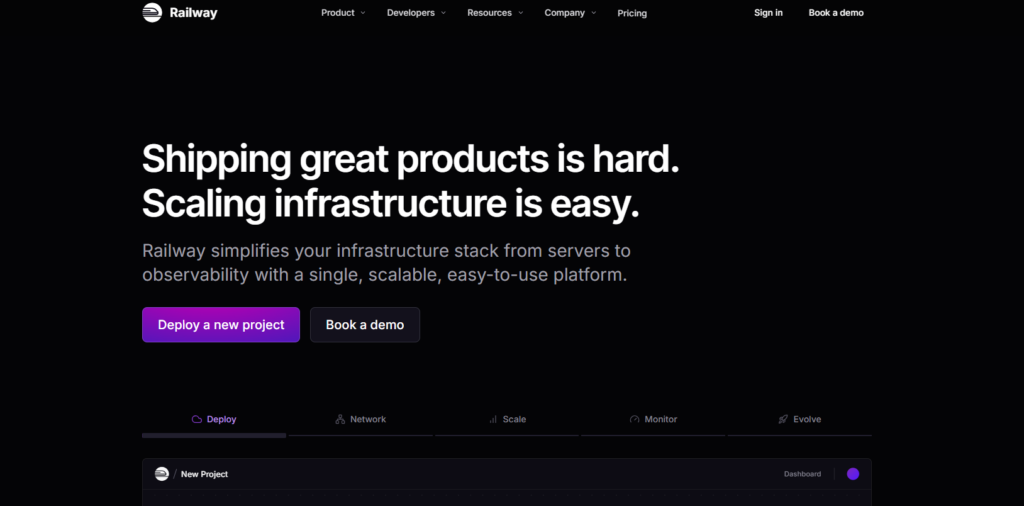
What makes Railway unique is its magical setup process. You just connect your GitHub repo, select your Node.js project, and it automatically detects everything. No Docker files, no complicated configurations—it just works. That’s a huge win for developers who don’t want to deal with infrastructure headaches.
Railway’s key strengths: It focuses on productivity. With an intuitive interface and quick deployment flow, Railway minimizes the learning curve. It also provides built-in support for databases like PostgreSQL and MySQL, automatic builds and deployments, secret management, and real-time logs.
Pros:
- No config deployment
- Extremely user-friendly interface
- Perfect for small to mid-sized apps
- Great for prototypes and MVPs
Cons:
- Limited customizability for advanced setups
- Pricing can add up as you scale multiple services
Pricing:
The Hobby plan allows you to deploy small apps for testing or demos. Paid plans start at about $5 per project per month, which includes more CPU, memory, and persistent storage.
If you want a hosting platform that feels like magic and helps you build faster without worrying about servers, Railway is a superb choice, especially for individual developers and startups.
Conclusion
In 2025, Node.js developers have a wealth of powerful hosting options. Whether you need simplicity, scalability, or enterprise-level performance, there’s a platform tailored for your project. From beginner-friendly solutions like Heroku and Railway to performance-driven platforms like Vercel and Render, the right choice depends on your goals, budget, and app size. Take time to evaluate each based on your specific needs and get building.
FAQs
1. Which Node.js hosting is best for beginners?
Heroku and Railway are great for beginners due to their easy setup and user-friendly interfaces.
2. Is there any free hosting for Node.js in 2025?
Yes, platforms like Vercel, Heroku, Railway, and Glitch offer free tiers.
3. What’s the most scalable hosting for Node.js?
AWS Elastic Beanstalk and Vercel offer strong scalability options for growing apps.
4. Which platform is best for full-stack Node.js apps?
Render and DigitalOcean App Platform are excellent for full-stack applications.
5. Can I use GitHub to deploy my Node.js app?
Yes, most platforms like Vercel, Render, Railway, and DigitalOcean support GitHub-based deployments.
Stop Wasting Time on Servers. Start Building Instead.
You didn’t start your project to babysit servers. Let ServerAvatar handle deployment, monitoring, and backups — so you can focus on growth.
Deploy WordPress, Laravel, N8N, and more in minutes. No DevOps required. No command line. No stress.
🚀 Try ServerAvatar Free – No Credit Card NeededTrusted by 10,000+ developers and growing.
